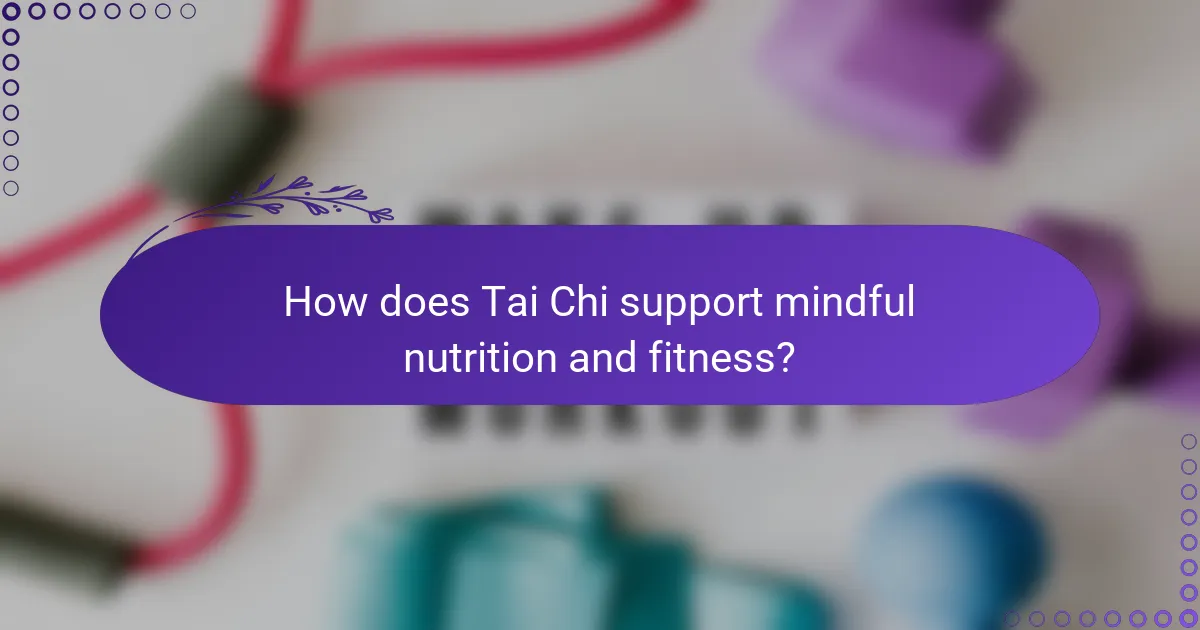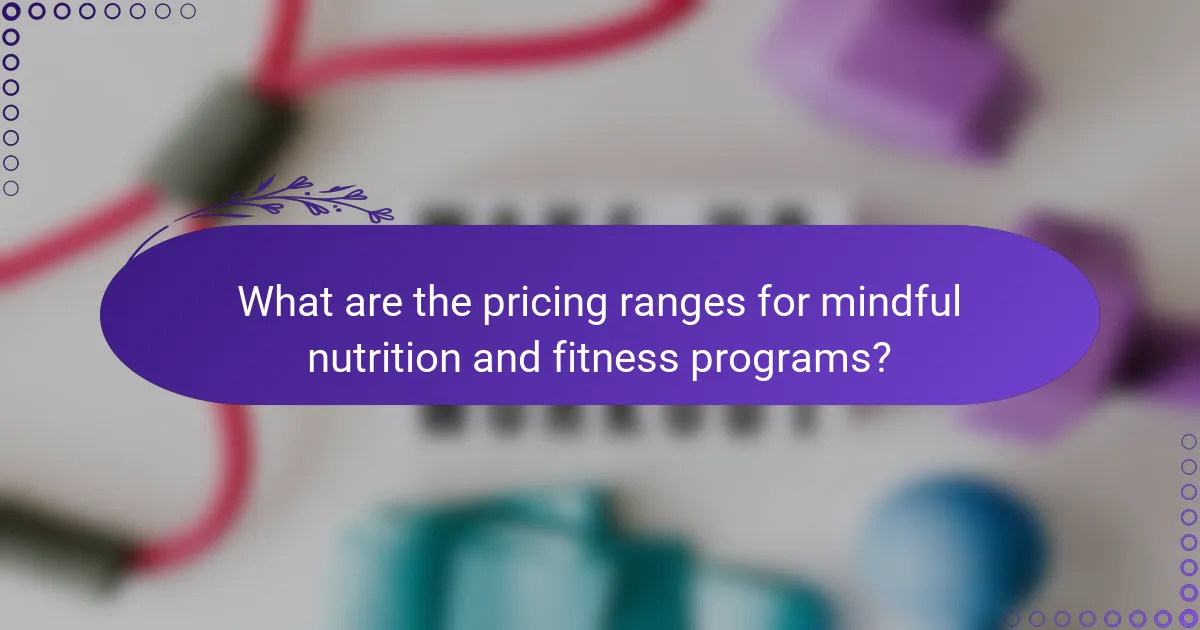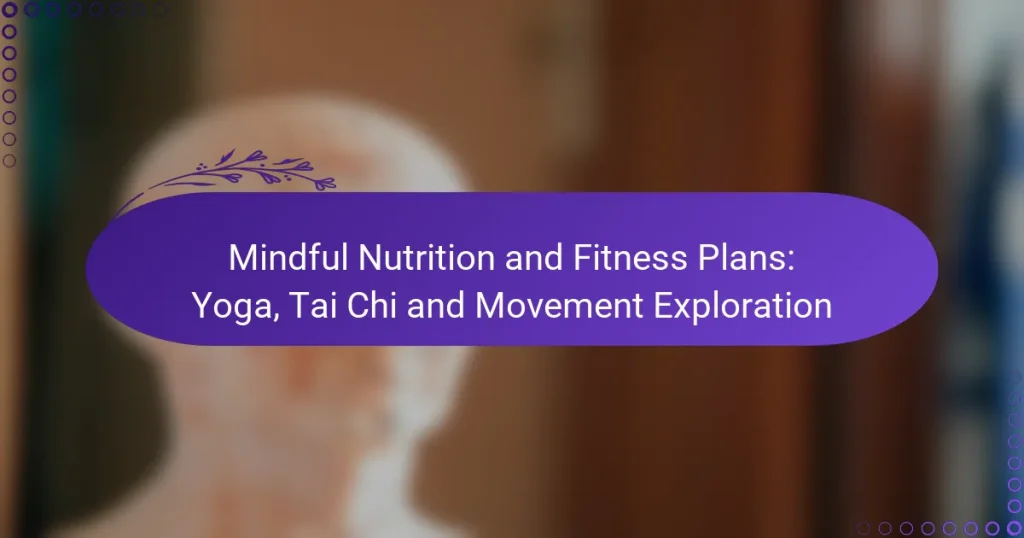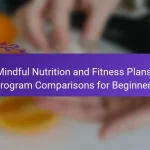Mindful nutrition plays a crucial role in enhancing fitness plans by fostering better energy management and mental clarity. By intentionally choosing nourishing foods, individuals can optimize their performance in practices like yoga and Tai Chi, which emphasize body awareness and holistic well-being. Incorporating these mindful approaches not only supports physical strength but also cultivates healthier eating habits and emotional balance.

How can mindful nutrition enhance fitness plans in Los Angeles?
Mindful nutrition can significantly enhance fitness plans in Los Angeles by promoting better energy management, mental focus, and recovery. By being intentional about food choices, individuals can fuel their bodies more effectively for physical activities like yoga, Tai Chi, and other movement practices.
Increased energy levels
Mindful nutrition leads to increased energy levels by ensuring that the body receives the right nutrients at the right times. Consuming a balanced diet rich in whole foods, such as fruits, vegetables, whole grains, and lean proteins, can provide sustained energy throughout the day.
In Los Angeles, where active lifestyles are common, incorporating snacks like nuts or yogurt can help maintain energy levels during workouts. Aim for meals that include a mix of carbohydrates and proteins to optimize energy for activities like yoga or Tai Chi.
Improved mental clarity
Improved mental clarity is another benefit of mindful nutrition, as it helps maintain stable blood sugar levels and supports cognitive function. Foods rich in omega-3 fatty acids, such as salmon and walnuts, can enhance brain health and focus.
Incorporating hydration into your nutrition plan is equally important. Drinking enough water throughout the day can prevent fatigue and support mental sharpness, especially during intense fitness sessions in the warm Los Angeles climate.
Better recovery times
Better recovery times can result from mindful nutrition by providing the body with essential nutrients needed for muscle repair and growth. Consuming a post-workout meal that includes protein and carbohydrates can accelerate recovery, allowing for more effective training sessions.
In Los Angeles, consider local options like smoothie bowls or protein-packed salads after workouts. Prioritizing recovery foods can help minimize soreness and prepare the body for the next fitness challenge, whether it’s a yoga class or a Tai Chi session in the park.

What are effective yoga practices for mindful nutrition?
Effective yoga practices for mindful nutrition focus on enhancing awareness of the body and its needs, promoting a balanced relationship with food. Incorporating yoga into your routine can help cultivate mindfulness, reduce stress, and encourage healthier eating habits.
Hatha yoga for stress reduction
Hatha yoga is a gentle form of yoga that emphasizes relaxation and stress relief. It involves slow-paced movements and breathing exercises, which can help calm the mind and reduce anxiety, making it easier to make mindful food choices.
To practice Hatha yoga for stress reduction, focus on poses such as Child’s Pose, Forward Bend, and Corpse Pose. These postures encourage deep breathing and relaxation, allowing you to connect with your body and its hunger signals more effectively.
Consider setting aside 20-30 minutes a few times a week for Hatha yoga sessions, and be mindful of how your body feels during and after practice. This awareness can translate into more conscious eating habits.
Vinyasa yoga for energy flow
Vinyasa yoga is a dynamic practice that links breath with movement, promoting energy flow throughout the body. This style of yoga can invigorate you and enhance your overall well-being, making it easier to approach nutrition with a positive mindset.
Incorporate poses like Sun Salutations and Warrior sequences into your Vinyasa practice to stimulate energy and improve circulation. Aim for sessions lasting 30-60 minutes, focusing on fluid transitions between poses to maintain a steady rhythm.
As you practice Vinyasa yoga, pay attention to how your energy levels fluctuate and how this affects your cravings and appetite. This awareness can help you make more informed choices about what and when to eat.

How does Tai Chi support mindful nutrition and fitness?
Tai Chi promotes mindful nutrition and fitness by integrating slow, deliberate movements that enhance physical awareness and mental focus. This practice encourages a holistic approach to health, fostering both physical strength and emotional well-being.
Enhances balance and coordination
Tai Chi is particularly effective at improving balance and coordination through its emphasis on slow, controlled movements. Practicing these movements helps strengthen the lower body and core, which are crucial for maintaining stability in daily activities.
Regular participation can lead to noticeable improvements in posture and body alignment, reducing the risk of falls, especially in older adults. Incorporating Tai Chi into your routine just a few times a week can yield significant benefits in overall physical stability.
Reduces stress and anxiety
Engaging in Tai Chi can significantly lower stress and anxiety levels by promoting relaxation and mindfulness. The meditative nature of the practice encourages participants to focus on their breath and movements, which can help clear the mind and reduce tension.
Studies suggest that practicing Tai Chi regularly can lead to improvements in mood and a decrease in symptoms of anxiety. Setting aside even 20-30 minutes a day for Tai Chi can create a calming effect, making it a valuable tool for managing stress in a busy lifestyle.

What movement exploration techniques can be integrated?
Movement exploration techniques encompass various practices that enhance physical awareness and creativity. Techniques such as improvisational dance and body awareness exercises can be seamlessly integrated into mindful nutrition and fitness plans to foster a deeper connection between mind and body.
Improvisational dance for creativity
Improvisational dance encourages spontaneous movement, allowing individuals to express emotions and thoughts through their bodies. This technique can be practiced in a variety of settings, from dance studios to living rooms, requiring no special equipment—just an open space and a willingness to explore.
To get started, set aside a few minutes to play music that inspires you. Allow your body to move freely without judgment or a predetermined structure. This practice not only enhances creativity but also promotes emotional release and physical fitness.
Body awareness exercises for mindfulness
Body awareness exercises focus on tuning into physical sensations, promoting mindfulness and reducing stress. Techniques such as progressive muscle relaxation or simple breath-focused movements help individuals cultivate a deeper understanding of their bodies and how they respond to different stimuli.
Begin with a few minutes of deep breathing, paying attention to how your body feels with each inhale and exhale. Incorporate gentle stretches or yoga poses that emphasize alignment and balance. Regular practice can lead to improved posture, reduced tension, and a greater sense of overall well-being.

What are the prerequisites for starting a mindful nutrition and fitness plan?
Starting a mindful nutrition and fitness plan requires a clear understanding of your dietary needs and fitness levels. This foundational knowledge helps tailor a program that aligns with your personal health goals and lifestyle.
Consultation with a nutritionist
Consulting with a nutritionist is essential for developing a personalized nutrition plan. A qualified nutritionist can assess your dietary habits, preferences, and any specific health concerns to create a balanced meal plan that supports your fitness objectives.
During this consultation, be prepared to discuss your current eating patterns, any allergies, and your fitness goals. This information allows the nutritionist to recommend appropriate macronutrient ratios and meal timing that suit your lifestyle.
Assessment of fitness levels
Assessing your fitness levels is crucial before starting any exercise regimen. This evaluation typically includes measuring your strength, flexibility, endurance, and cardiovascular health, which can help determine the most suitable activities for you.
Common methods for assessing fitness include fitness tests, such as the sit-and-reach test for flexibility or a timed run for cardiovascular endurance. Understanding your current fitness level enables you to set realistic goals and track your progress effectively.

How to choose the right mindful nutrition plan?
Choosing the right mindful nutrition plan involves aligning your dietary choices with your personal values, health goals, and lifestyle. Consider factors such as food preferences, nutritional needs, and how these choices can support your overall well-being.
Personal dietary preferences
Your personal dietary preferences play a crucial role in selecting a mindful nutrition plan. Consider whether you prefer plant-based, omnivorous, or other specific diets. This alignment ensures that you enjoy your meals, making it easier to stick to your plan.
Take into account any food allergies or intolerances you may have, as well as cultural or ethical considerations that influence your food choices. For instance, if you follow a vegetarian or vegan diet, focus on plant-based sources of protein and essential nutrients.
Specific fitness goals
Your specific fitness goals should guide your nutrition plan. Whether you aim to lose weight, build muscle, or enhance endurance, your dietary choices should support these objectives. For example, a weight loss plan may emphasize lower calorie intake, while muscle gain requires increased protein consumption.
Consider tracking your macronutrient intake to ensure you meet your fitness goals effectively. A common approach is to maintain a balanced ratio of carbohydrates, proteins, and fats, adjusting based on your activity level and desired outcomes. Consulting with a nutritionist can provide personalized guidance tailored to your fitness aspirations.

What are the pricing ranges for mindful nutrition and fitness programs?
Mindful nutrition and fitness programs typically range from affordable to premium pricing, depending on the type and duration of the classes or workshops. For instance, yoga classes may cost between $10 to $30 per session, while Tai Chi workshops can vary from $15 to $50 per session.
Yoga classes in Los Angeles
In Los Angeles, yoga class prices can vary significantly based on the studio and instructor experience. Generally, drop-in rates range from $15 to $30 per class, while monthly memberships can cost around $100 to $200, offering unlimited access to classes.
Many studios also provide package deals, such as 5 or 10-class passes, which can reduce the per-class cost. Additionally, some places offer sliding scale fees or community classes at lower rates, making yoga more accessible.
Tai Chi workshops pricing
Tai Chi workshops in the U.S. usually charge between $15 and $50 per session, depending on the length and instructor qualifications. Some workshops may offer discounts for early registration or group bookings, which can make participation more affordable.
It’s beneficial to check local community centers or wellness studios, as they often host Tai Chi classes at lower rates or even for free. Consider looking for introductory sessions or trial classes to explore different styles before committing to a longer-term program.


